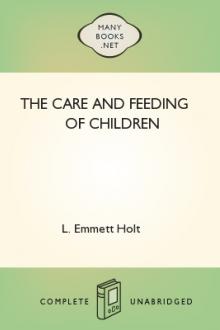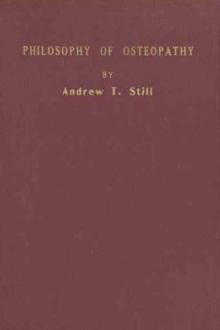The Care and Feeding of Children, L. Emmett Holt [phonics books .txt] 📗

- Author: L. Emmett Holt
- Performer: -
Book online «The Care and Feeding of Children, L. Emmett Holt [phonics books .txt] 📗». Author L. Emmett Holt
At what age should the fontanel close?
The average is about eighteen months. It seldom closes earlier than fourteen months, and it should not be open at two years.
At what age should a child hold up its head?
As a rule during the fourth month, and often during the third month, the head can be held erect when the body is supported.
When does an infant first laugh aloud?
Usually from the third to the fifth month.
When does it begin to reach for toys and handle them?
Usually from the fifth to the seventh month.
At what age should a child be able to sit and to stand alone?
At seven or eight months a healthy child is usually able to sit erect and support the body. During the ninth and tenth months are usually seen the first attempts to bear the weight upon the feet, and at eleven or twelve months most children can stand with assistance.
When should a child walk alone?
The first attempts are generally seen in the twelfth or thirteenth month. At fifteen or sixteen months the average child is able to run alone.
What conditions postpone these events?
Prematurity, a very delicate constitution, any severe or prolonged illness, and especially chronic disturbances of digestion making feeding difficult. A common cause of late sitting, standing, or walking is rickets.
Should a child be urged to walk?
Never; he is usually quite willing to do so as soon as his muscles and bones are strong enough. None of the contrivances for teaching children to walk are to be advised.
When do children begin to talk?
Generally at one year a child can say "papa" and "mamma" or other single words. At the end of the second year the average child is able to put words together in short sentences.
If at two years the child makes no attempt to speak, what should be suspected?
Either that the child is a deaf-mute or that it is mentally deficient, although this is occasionally seen in children who are only very backward.
Table showing the Average Weight, Height, and Circumference
of Head and Chest of Boys[1]
The above weights are with ordinary house clothes.
DENTITION
How many teeth are there in the first set?
Twenty.
What is the time of their appearance?
The two central lower teeth are usually the first to appear, and come from the fifth to the ninth month; next are the four upper central teeth, which come from the eighth to the twelfth month. The other two lower central teeth and the four front double teeth come from the twelfth to the eighteenth month. Then follow the four canine teeth, the two upper ones being known as the "eye teeth," and the two lower as the "stomach teeth"; they generally come between the eighteenth and the twenty-fourth month. The four back double teeth, which complete the first set, come between the twenty-fourth and thirtieth month.
At one year a child usually has six teeth. At one and a half years, twelve teeth. At two years, sixteen teeth. At two and a half years, twenty teeth.
What are the causes of variation?
The time of appearance of the teeth varies in different families; in some they come very early, in others much later. The teeth may come late as a result of prolonged illness and also from rickets.
What symptoms are commonly seen with teething?
In healthy children there is very often fretfulness and poor sleep for two or three nights; there may be loss of appetite, so that only one half the usual amount of food is taken; there is salivation or drooling, and often slight fever; there may be some symptoms of indigestion, such as vomiting or the appearance of undigested food in the stools. In delicate children all these symptoms may be much more severe.
How long do these symptoms last?
Usually only three or four days; but there may be no gain in weight for two or three weeks.
What is the cause of most of the other symptoms attributed to teething?
Nearly all of them come from indigestion due to bad feeding.
PART II
INFANT FEEDING
What is the best infant food?
Mother's milk.
Of what is mother's milk composed?
Thirteen parts solids and eighty-seven parts water.
What are the solids?
Fat, sugar, proteids, and salts.
What is the fat?
The cream.
What is the sugar?
It is lactose, or milk sugar.
What are the proteids?
The curd of the milk.
Are all these elements necessary?
Yes; we cannot expect to rear a healthy infant unless they are all in his food.
Of what use is the fat?
It is needed for the growth of the bones, the nerves, the fat of the body, and the production of heat.
Of what use is the sugar?
It is needed for the production of heat, and to make fat in the body.
Of what use are the proteids?
They are needed for the growth of the cells of the body, such as those of the blood, the various organs, and the muscles.
Of what use are the salts?
Particularly for the growth of bone.
Of what use is the water?
By means of the water the food is kept in a state of minute subdivision or in solution, so that the delicate organs of a young infant can digest it. It is also necessary to enable the body to get rid of its waste.
NURSING
Should all mothers attempt to nurse their children?
As a rule they should do so, but there are many conditions when they should not.
What are the most important ones?
If the mother has or has had tuberculosis or any other serious chronic disease, or is herself in very delicate health, she should not try. She is likely soon to fail in nourishing her child, and the attempt may do herself much harm as well as injure the child.
How often should infants be nursed during the first two days of life?
Usually only four or five times daily, since there is very little milk secreted at this time.
When does the milk come in abundance?
Usually on the third day, sometimes not until the fourth or fifth day.
Should the infant be fed anything additional during the first two days?
Usually not; if much food were necessary, we may be sure Nature would have provided it. Water, however, should be given regularly.
How frequently should an infant be nursed during the first week?
After the third day, every two hours during the day and twice during the night. The frequency during the rest of the first year is given in the following table:
6 A.M.). 1st and 2d day 4 6 hours. 1 3 days to 6 weeks 10 2 hours. 2 6 weeks to 3 months 8 2½ hours. 2 3 to 5 months 7 3 hours. 1 5 to 12 months 6 3 hours. 0
How long should the child be kept at the breast for one nursing?
Not over twenty minutes.
Should the child take both breasts at one nursing?
If the milk is very abundant one breast may be sufficient, otherwise both breasts may be taken.
What are the important things to be attended to in nursing?
First, regularity; it is just as important as in the case of bottle-feeding. Secondly, the nipples should be kept clean by being washed after every nursing.
What should be the diet of a nursing mother?
She should have a simple but generous diet with plenty of fluids; three regular meals may be given and gruel, milk, or cocoa at bed-time and sometimes between meals. She may take eggs, cereals, most soups, and nearly all vegetables, avoiding sour fruits, salads, pastry, and most desserts. Meat should not be taken more than twice daily, and in many cases but once. She should take but little tea or coffee, and ordinarily no wine or beer.
Are fruits likely to disturb a nursing infant?
Sour fruits in some cases may do so, but sweet fruits and most cooked fruits are useful.
What else is important in the life of the nursing mother?
She should lead a simple natural life; should have regular out-of-door exercise, preferably walking or driving, as soon after her confinement as her condition will permit. She should have regular movements from the bowels daily. She should be as free as possible from unnecessary cares and worry; her rest at night should be disturbed as little as possible; she should lie down for at least one hour in the middle of the day.
Does the nervous condition of the mother affect the milk?
Very much more than her diet; worry, anxiety, fatigue, loss of sleep, household cares, social dissipation etc., have more than anything else to do with the failure of the modern mother as a nurse. Uncontrolled emotions, grief, excitement, fright, passion, may cause milk to disagree with the child; at times they may excite acute illness, and at other times they may cause a sudden and complete disappearance of the milk.
Does menstruation affect the milk?
In nearly all cases the quantity of milk is lessened so that the infant is not satisfied and may gain less in weight or not at all. In many cases the quality of the milk is also affected to such a degree as to cause slight disturbances of digestion, such as restlessness, colic, and perhaps some derangement of the bowels. In a few, attacks of acute indigestion are excited.
Is regular menstruation a reason for stopping nursing?
Not invariably; as a rule both functions do not go on together. But if the child is gaining regularly in weight between the periods, nursing may be continued indefinitely, although it may be well to feed the infant wholly or in part during the first day or two that the mother is unwell.
What symptoms indicate that a nursing infant is well nourished?
The child has a good colour, sleeps for two or three hours after nursing, or, if awake, is quiet, good-natured, and apparently comfortable. It has normal movements of the bowels and gains steadily in weight.
What symptoms indicate that a child who is nursing is not properly nourished?
It does not gain and may even lose in weight. It no longer exhibits its usual energy and playfulness, but is either listless and indifferent or cross, fretful and irritable, and is apt to sleep poorly. It grows pale and anæmic and its tissues become soft and flabby. When the milk is scanty it will often nurse a long time at the breasts, sometimes three quarters of an hour, before stopping. At other times it may take the breast for a moment only, and then turn away in apparent disgust.
What should be done when such symptoms appear?
This depends upon the severity of the symptoms and how long they have lasted. If the child has made no gain for three or four weeks, or is losing weight, immediate weaning will probably be necessary; in any case, other food in addition to the breast milk should be given at once. One may begin by alternating the nursing and the bottle-feeding and increase the number of bottle-feedings as may be indicated by the results.
Is there any objection to a baby being partly nursed and partly fed?
None whatever; it is often better from the outset to feed the baby during the night, in order not to disturb the mother's rest.
What symptoms indicate that the mother's milk disagrees with the child?
The child suffers from almost constant discomfort sleeps; little and then restlessly, cries a great deal, belches gas from the stomach, and passes much by





Comments (0)